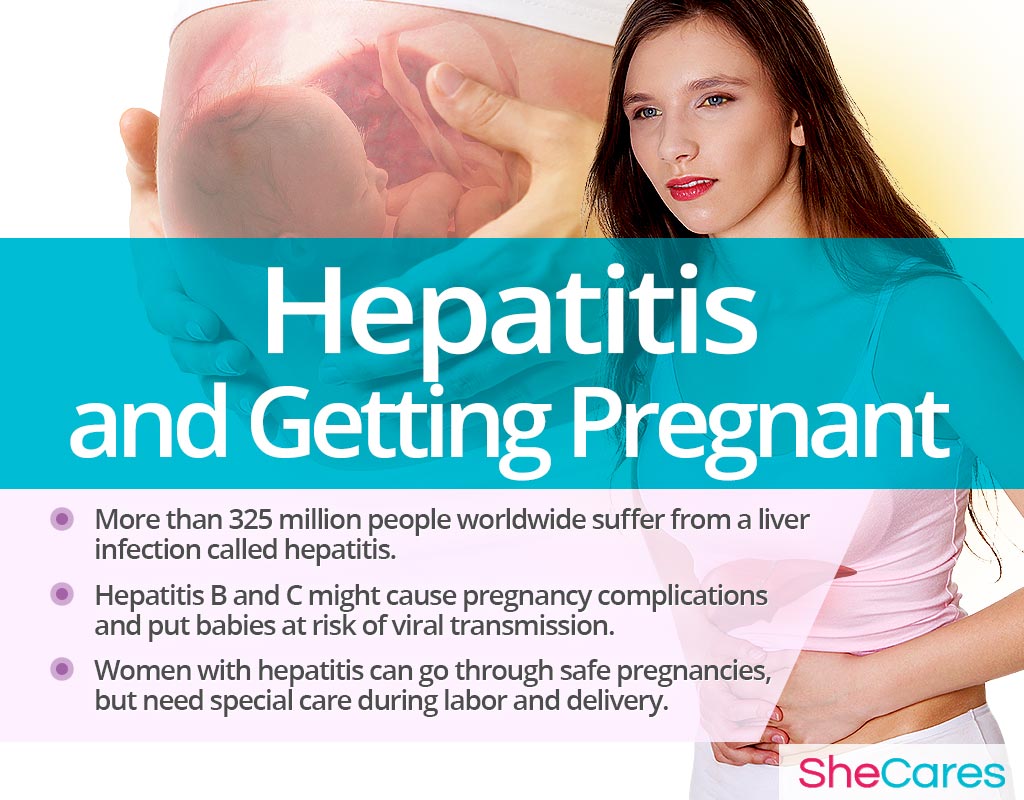Brief Overview of Hepatitis
Hepatitis is a liver infection that can be caused by one of five viruses: hepatitis A, B, C, D, and E. However, viruses that require special management before and during pregnancy - due to their effects on the health of the mother and her baby - include hepatitis B virus (HBV) and hepatitis C virus (HCV).
Both of these viruses are spread through contact with blood, semen, and vaginal fluids through drug use, sexual intercourse, and childbirth. The symptoms of an acute hepatitis infection include nausea with vomiting, abdominal pain, loss of appetite, or jaundice; whereas, its chronic form might be asymptomatic or over time develop into liver damage, cancer, and death.
Possible Effects of Hepatitis B and C on Pregnancy
Effects of Hepatitis on Fertility
Hepatitis C has not been associated with causing infertility. However, some women with chronic hepatitis B infection or advanced liver damage, called cirrhosis, suffer from menstrual irregularities and are at an increased risk of tubal and uterine infertility.
Effects of Hepatitis on the Mother and Fetus
Both HBV and HCV can be passed down from the mother to her baby. The transmission mainly occurs during childbirth with exposure to fluids and blood.
The risk of transmission is as follows for both viruses:
Hepatitis C: relatively low, about 5%, but it increases if a woman has high levels of the virus in the blood, liver damage, and an acute infection.
Hepatitis B: high, about 90% of women with acute infection will pass the virus to their child, and 10-20% of those that have chronic hepatitis.
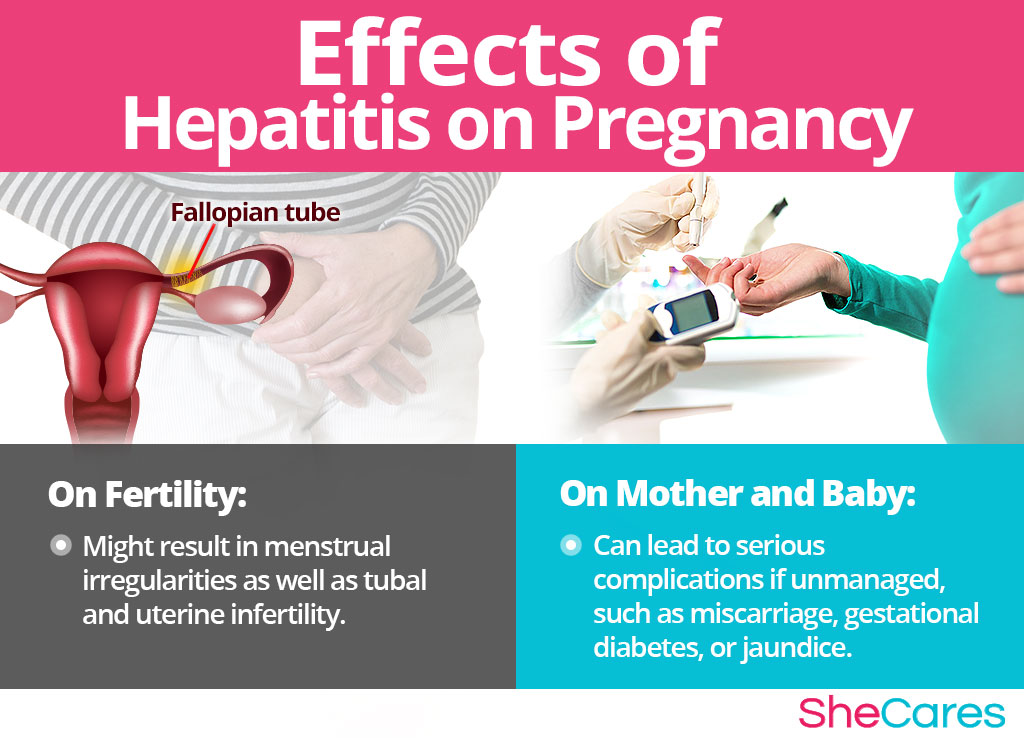
Risks and Complications
Unmanaged hepatitis might lead to miscarriage, rupture of esophageal varices, jaundice, gestational diabetes, acute fatty liver of pregnancy, low birth-weight, and premature birth.
Action Plan
Months Prior to Conceiving
Your goal before getting pregnant is to improve the health of your liver and boost your fertility.
Healthy Diet
All you eat, passes through your liver. So, a balanced diet can help you improve its function. Consume a wide variety of nutritious foods, focusing on those that can protect the liver, reduce inflammation, and strengthen your immunity:
Fiber-rich foods, like oatmeal, quinoa, brown rice, or buckwheat
Fruits and vegetables, such as watermelon, cherries, and broccoli
Healthy fats, such as avocado, olive oil, and coconut oil
Lean meats, such as chicken, turkey, or low-mercury fish like salmon
Phytoestrogenic foods, such as flax seeds, beans, and tomatoes
Omega-3 fatty acids found in nuts, sacha inchi oil, and chia seeds
Probiotics in natural yogurt, kefir, or kombucha
Limit iron-rich foods and salt to prevent toxic waste products and water buildup in your liver.
Adequate Exercise
Having excess weight can weaken the liver and put women with hepatitis at risk of diabetes. Regular physical activity will help you reach a healthy weight, improve circulation, and prevent extensive liver damage.
Aim to get 150 minutes of moderate-level physical activity a week, such as walking, dancing, or jogging.
If you are trying to lose weight, alternate between static exercises and aerobics to promote fat burning.
Avoid lifting weights and other strenuous exercises as it might inhibit your fertility.
Treatment
Depending on the stage of your infection, you might have to take medications to stop the hepatitis virus from replicating and causing damage to your liver.
Review your drugs and supplements with the doctor before getting pregnant as some of them might cause birth defects and should not be continued during pregnancy.
Vitamins and Supplements
Hepatitis might affect how well your liver absorbs nutrients from food. So, vitamins and supplements might be needed to resolve potential nutritional deficiencies:
Prenatal vitamins, such as folic acid, will prepare your body for pregnancy and prevent birth defects. Read more about prenatal vitamins.
Hormone-regulating supplements, like Macafem, can help you increase your fertility by balancing your reproductive hormones.
B-complex vitamins can support liver functions and reduce the symptoms of hepatitis.
Probiotic supplements can prevent infections and ease inflammation in the liver.
It is always recommended to consult with your doctor before taking any supplements to prevent unwanted side effects.
Good Habits
Before conceiving, it is important to get tested for other STDs, especially HIV, because they might require additional treatments. Read more about HIV and preparing for pregnancy.
Quit alcohol as it can cause liver damage, infertility, and birth defects.
Coffee has been found to relieve the symptoms of liver disease, such as hepatitis, although its limited consumption is usually advised during pregnancy.
Track your menstrual cycle for several months before conceiving to be able to estimate your ovulation day and fertility window.
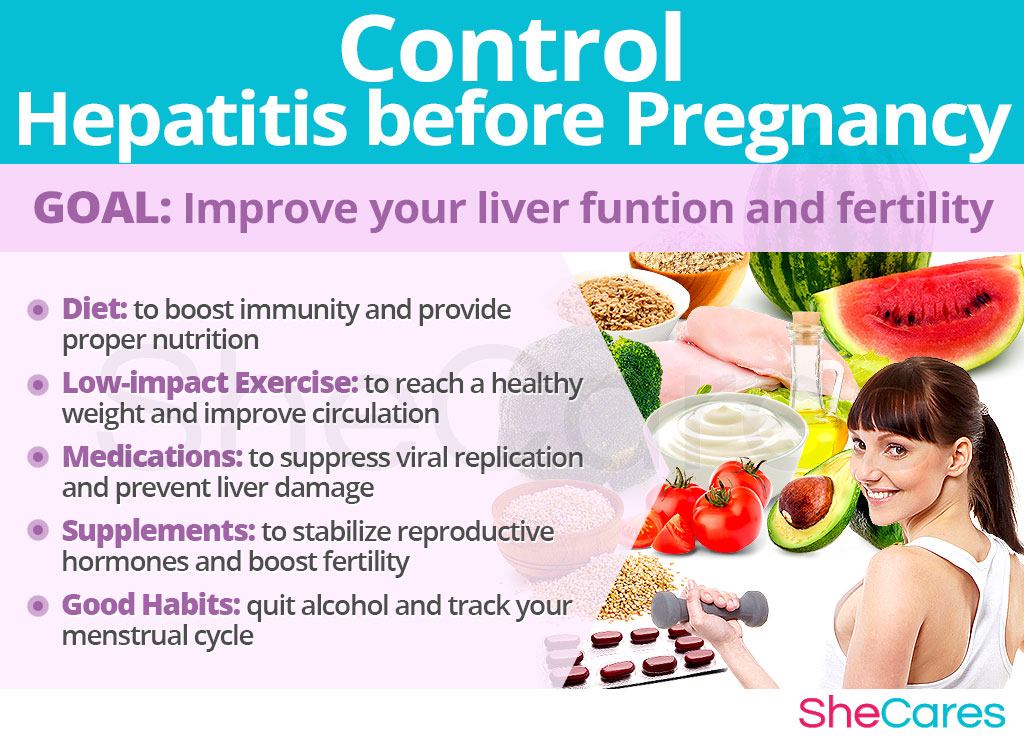
Tips for Conceiving with Hepatitis
Conception can be a stressful time for many couples. So, to prevent the negative effects of prolonged stress on fertility and your liver, consider the following:
Add more plant-based protein sources, like nuts and beans, to increase your ovulatory fertility.
Find your optimal way to reduce stress. It could be reading a book, going for a walk, meditating, or volunteering at a local animal shelter.
Aim to have sex daily four to five days before and on your ovulation day to optimize your chances of conceiving.
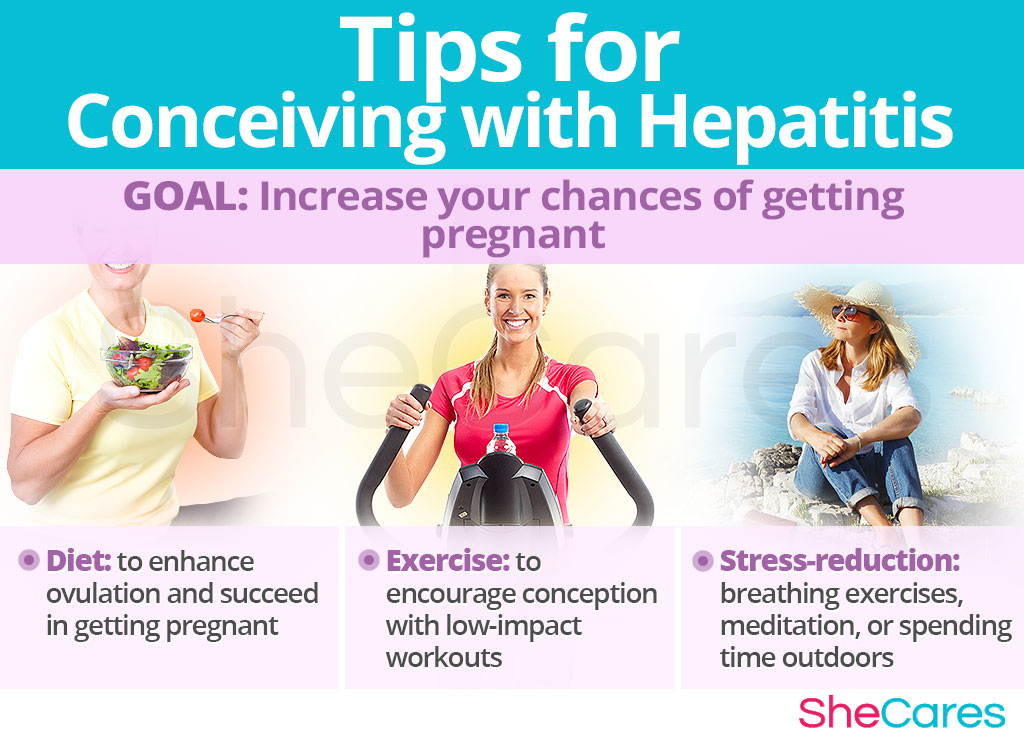
Manage Hepatitis during Pregnancy
Many pregnant women with chronic hepatitis B or C do not experience a worsening of symptoms during pregnancy. However, those nine months are a time of many new changes in your body, so keep the following recommendations in mind:
Keep regular doctor's visits to check your liver function and viral activity in your body.
Monitor your food intake as some nutrients might be lost due to morning sickness.
Women with chronic hepatitis B and C can have vaginal deliveries because C-sections do not reduce the risk of viral transmission.
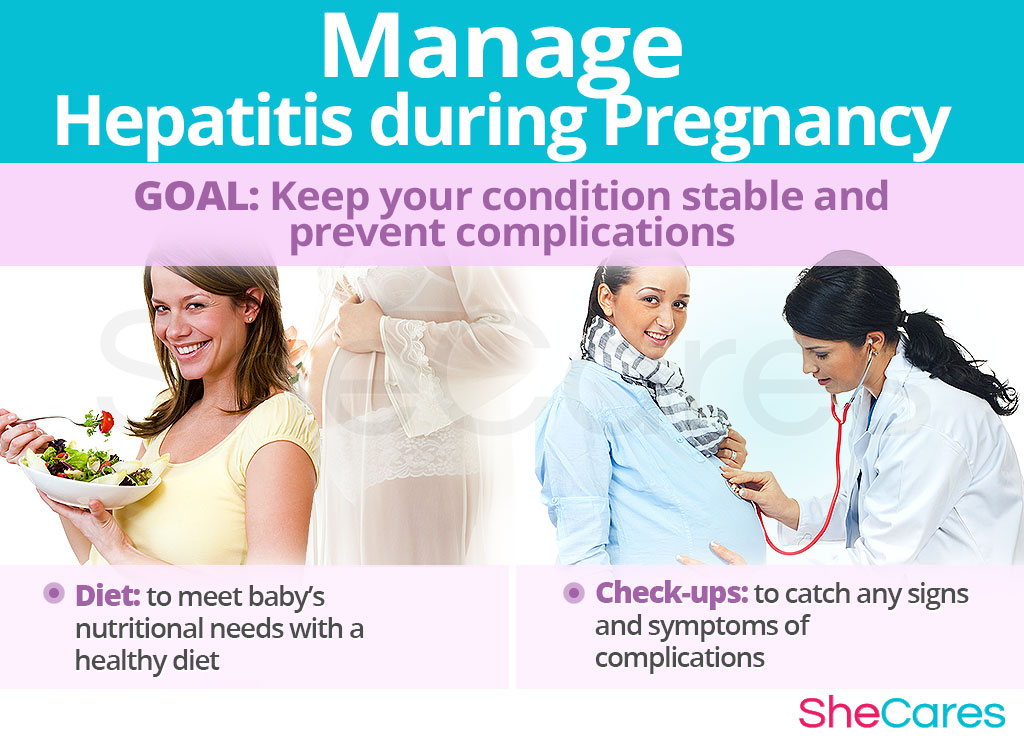
Key Takeaways
Women with hepatitis B and C have doubts before getting pregnant for good reasons. Their chronic condition might potentially compromise their ability to have healthy children, but with proper medical treatment along with supporting practices, such as a liver-healthy diet, exercise, and supplements, like Macafem, you can prevent hepatitis from standing in your way of becoming a mother.
Sources
- American Association for the Study of Liver Disease. (2017). HCV in Pregnancy. Retrieved December 13, 2017 from https://www.hcvguidelines.org/unique-populations/pregnancy
- American Liver Foundation. (n.d.). Liver Disease Diets. Retrieved December 13, 2017 from https://www.liverfoundation.org/for-patients/about-the-liver/health-wellness/nutrition/#1504047395929-de1cffa1-ccf5
- Cleveland Clinic. (2010). Liver Disease in Pregnancy. Retrieved December 13, 2017 from http://www.clevelandclinicmeded.com/medicalpubs/diseasemanagement/hepatology/liver-disease-in-pregnancy/
- Journal of Pertinatology. (2014). Hepatitis B and C in pregnancy: a review and recommendations for care. Retrieved December 13, 2017 from https://www.ncbi.nlm.nih.gov/pmc/articles/PMC4777346/
- Journal of the Pediatric Infectious Diseases Society. (2014). Hepatitis C Virus in Pregnancy and Early Childhood: Current Understanding and Knowledge Deficits. Retrieved December 13, 2017 from https://academic.oup.com/jpids/article/3/suppl_1/S13/904986
- Medline Plus. (2017). Diet – liver disease. Retrieved December 13, 2017 from https://medlineplus.gov/ency/article/002441.htm
- National Center for Complementary and Integrative Health. (2017). Hepatitis C: A Focus on Dietary Supplements. Retrieved December 13, 2017 from https://nccih.nih.gov/health/hepatitisc/hepatitiscfacts.htm
- The American College of Obstetricians and Gynecologists. (2013). Hepatitis B and Hepatitis C in Pregnancy. Retrieved December 13, 2017 from https://www.acog.org/Patients/FAQs/Hepatitis-B-and-Hepatitis-C-in-Pregnancy
- World Journal of Gastroenterology. (2012). Hepatitis B in pregnancy. Retrieved December 13, 2017 from https://www.ncbi.nlm.nih.gov/pmc/articles/PMC3442205/
